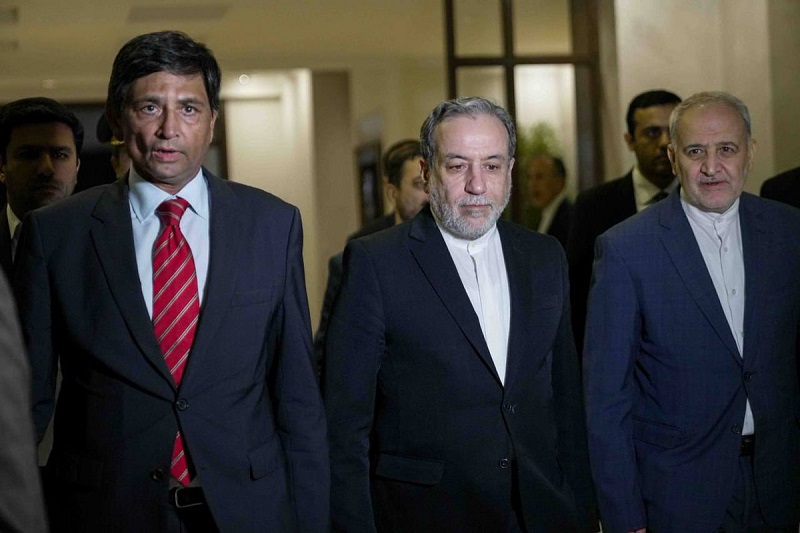Iran’s Foreign Minister Abbas Araghchi Visits Islamabad for Talks on Regional Developments
Islamabad, Pakistan – Iranian Foreign Minister Abbas Araghchi arrived in Islamabad on November 5, 2024, for a two-day official visit aimed at discussing key regional developments and enhancing bilateral relations between Iran and Pakistan. His visit comes at a time of heightened geopolitical tensions in the region, with discussions expected to focus on security cooperation, economic ties, and mutual concerns over regional stability.
Objectives of the Visit
During his stay, Araghchi is scheduled to meet with Pakistani officials, including Foreign Minister Bilawal Bhutto Zardari and other key members of the government. The talks are anticipated to cover a wide range of issues, including counterterrorism efforts, trade and economic collaboration, and the ongoing challenges posed by the evolving security landscape in Afghanistan.
The Iranian Foreign Minister has emphasized the importance of close cooperation between Iran and Pakistan, particularly in addressing shared security threats and promoting economic development in border areas. In recent months, both nations have expressed a desire to strengthen their ties, recognizing that regional stability is crucial for their respective national interests.
Regional Security Concerns
One of the central topics of discussion is expected to be the situation in Afghanistan following the Taliban’s return to power in 2021. Both Iran and Pakistan share concerns about the resurgence of extremist groups and the potential spillover of violence into their territories. The two countries have previously engaged in dialogues to coordinate their approaches to security in the region, and this visit aims to build on those discussions.
In a statement prior to his visit, Araghchi underscored the need for collaborative efforts to combat terrorism and extremism, noting that “the security of Iran is directly linked to the security of Pakistan and vice versa.” This sentiment reflects a growing recognition that both nations must work together to address the complexities of regional security, especially given the historical ties and shared borders they possess.
Economic Ties and Trade
In addition to security matters, the talks are expected to focus on enhancing economic ties between Iran and Pakistan. Both countries have expressed interest in increasing trade volumes and exploring joint economic projects that could benefit their respective economies. With sanctions impacting Iran’s economy, there is a renewed urgency for both nations to bolster economic cooperation.
Discussions may include the development of infrastructure projects, such as the long-discussed Iran-Pakistan gas pipeline, which has faced numerous delays over the years. This pipeline has the potential to significantly enhance energy security for both nations, providing Iran with a crucial outlet for its gas and Pakistan with a much-needed energy source.
Broader Geopolitical Context
Araghchi’s visit occurs within a broader geopolitical context, as regional powers navigate complex relationships amid shifting alliances. The recent rapprochement between Iran and Saudi Arabia has changed the dynamics of Middle Eastern politics, and both Iran and Pakistan are keen to ensure their interests are represented in any evolving security framework.
Furthermore, with the United States maintaining a strategic presence in the region, both Iran and Pakistan are aware of the need to assert their sovereignty and address concerns related to foreign influence. Araghchi’s visit may signal a united front on regional issues, emphasizing the importance of dialogue and cooperation over confrontation.
Public and Political Reactions
Reactions to Araghchi’s visit have been mixed within Pakistan. While some political factions advocate for stronger ties with Iran, citing shared cultural and historical connections, others express caution regarding Iran’s influence in the region. As discussions unfold, the Iranian Foreign Minister will need to navigate these domestic sentiments to foster a collaborative environment.
Conclusion
As Abbas Araghchi engages in talks in Islamabad, the outcome of this visit will likely have significant implications for the future of Iran-Pakistan relations. The focus on security cooperation and economic development reflects a mutual recognition of the challenges both nations face in an increasingly complex regional landscape.
The importance of these discussions cannot be overstated, as both countries seek to forge a path toward stability and prosperity. The outcome of Araghchi’s visit may pave the way for deeper bilateral ties and collaborative efforts in addressing shared challenges, reaffirming the idea that cooperation is essential for enduring peace and security in the region.
In the coming days, analysts will be closely watching for any announcements regarding joint initiatives or agreements that may arise from these high-level talks, as both nations strive to solidify their partnership amid a rapidly changing geopolitical environment.
